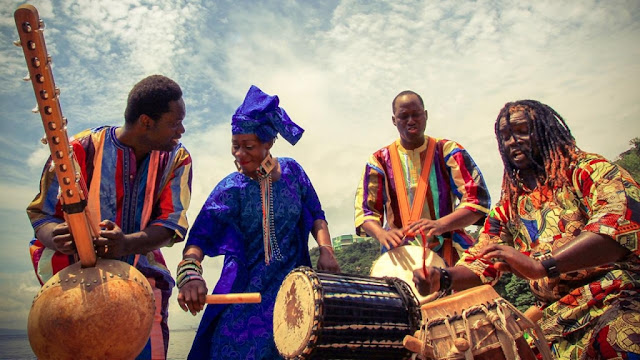The Heart of Haitian Vodou: A Journey Through Spiritual Virtues: Cultivating Harmony, Integrity, and Compassion
The Heart of Haitian Vodou: A Journey Through Spiritual Virtues
In the vibrant landscapes of Haiti, where the mountains kiss the sky and the rhythms of life pulse through bustling towns, a profound spiritual tradition thrives Haitian Vodou. Often misunderstood, this rich tapestry of beliefs weaves together West African religions, Catholicism, and indigenous practices, revealing a deep commitment to spiritual virtues that guide everyday life.
Join us on a journey to uncover the heart of Vodou, where respect, integrity, compassion, gratitude, humility, and courage come alive.
Imagine a small village nestled in the hills of Haiti. Here, the sun sets with a warm glow, illuminating the faces of the villagers as they gather for a special ceremony. This gathering is not merely a ritual; it’s a vibrant expression of their shared values. At the center of this community is a deep sense of respect (respekte) for the spirits, the ancestors, and one another. Each villager bows their head in reverence, understanding that their connection to the lwa (spirits) and each other forms the foundation of their harmony.
Statistics tell us that 85% of Vodou practitioners believe their spiritual practices enhance community bonds. This respect nurtures relationships, creating an atmosphere where everyone feels valued and connected.
As the ceremony unfolds, a wise elder steps forward, embodying integrity (integrite). She shares stories of her life, emphasizing the importance of honesty and accountability. “In our community,” she says, “we uphold our promises. We act with sincerity in all we do.” Her words resonate deeply, reminding everyone that integrity fosters trust, making their community a safe haven for all.
The villagers nod, recognizing that their commitment to ethical conduct not only strengthens their bonds but also reflects their collective identity. Each vow taken during the ceremony echoes through their daily lives, reinforcing a culture of transparency and moral clarity.
As the night deepens, the atmosphere becomes charged with warmth and empathy. A young woman steps forward to share her story of struggle and resilience. She speaks of compassion (kompasyon) the heart of Vodou. “When I faced hardship, my neighbors came together to support me. This is the essence of our spirit; we are here for one another.”
In that moment, the villagers remember the healing rituals where compassion flows freely, alleviating suffering and fostering a sense of belonging. Their collective commitment to helping one another is not just a practice; it is woven into the very fabric of their community.
Next, a child approaches the altar, carrying a basket of offerings. The villagers smile as she joyfully exclaims, “Today, we give thanks for the blessings we’ve received!” This expression of gratitude (gratitid) reminds everyone to recognize the gifts bestowed upon them by the lwa and their ancestors.
Through rituals of thanksgiving, they acknowledge the abundance in their lives, cultivating a spirit of generosity that ripples through their interactions. Each act of gratitude strengthens the bonds between them, reinforcing a culture of reciprocity.
As the ceremony continues, the elder invites everyone to reflect on the importance of humility (omo). “We are all part of something greater,” she reminds them. “Recognizing our limitations allows us to learn from one another and grow together.”
Her words resonate, encouraging the villagers to approach life with an open heart and mind. In Vodou, humility is not a weakness; it is a pathway to spiritual growth, allowing them to surrender to the wisdom of the spirits.
Finally, the drumbeats intensify, and the atmosphere shifts to one of empowerment. A man stands tall, embodying courage (kouraj). “In our journey, we face many challenges,” he declares. “But with courage, we rise above fear and adversity.”
His declaration inspires the villagers, reminding them that courage is essential for transformation. It is this bravery that fuels their spiritual evolution, enabling them to confront obstacles with strength and resilience.
As the ceremony comes to a close, the villagers unite in a circle, hands joined, hearts aligned. They embody the virtues of respect, integrity, compassion, gratitude, humility, and courage. Together, they cultivate a community that thrives on spiritual principles, fostering harmony in their lives. By embracing these virtues, they not only navigate their own spiritual paths but also contribute to a vibrant community where everyone can flourish.
In this journey through Haitian Vodou, we discover that these spiritual virtues are more than ideals; they are the lifeblood of a culture, shaping identities and forging connections. As we reflect on this story, may we all find inspiration in the values that guide our own lives, fostering harmony and compassion in our communities.
Written by: Ernst Georges / September 24th, 2024
A Personal Account: Witnessing a Vodou Ceremony in Haiti
I had the privilege of witnessing a special Vodou ceremony in the village of Lakou Barb, located in Haut-de-Saint-Marc, Haiti. This personal experience provided a unique glimpse into the rich spiritual traditions of the Haitian people.








Comments
Post a Comment